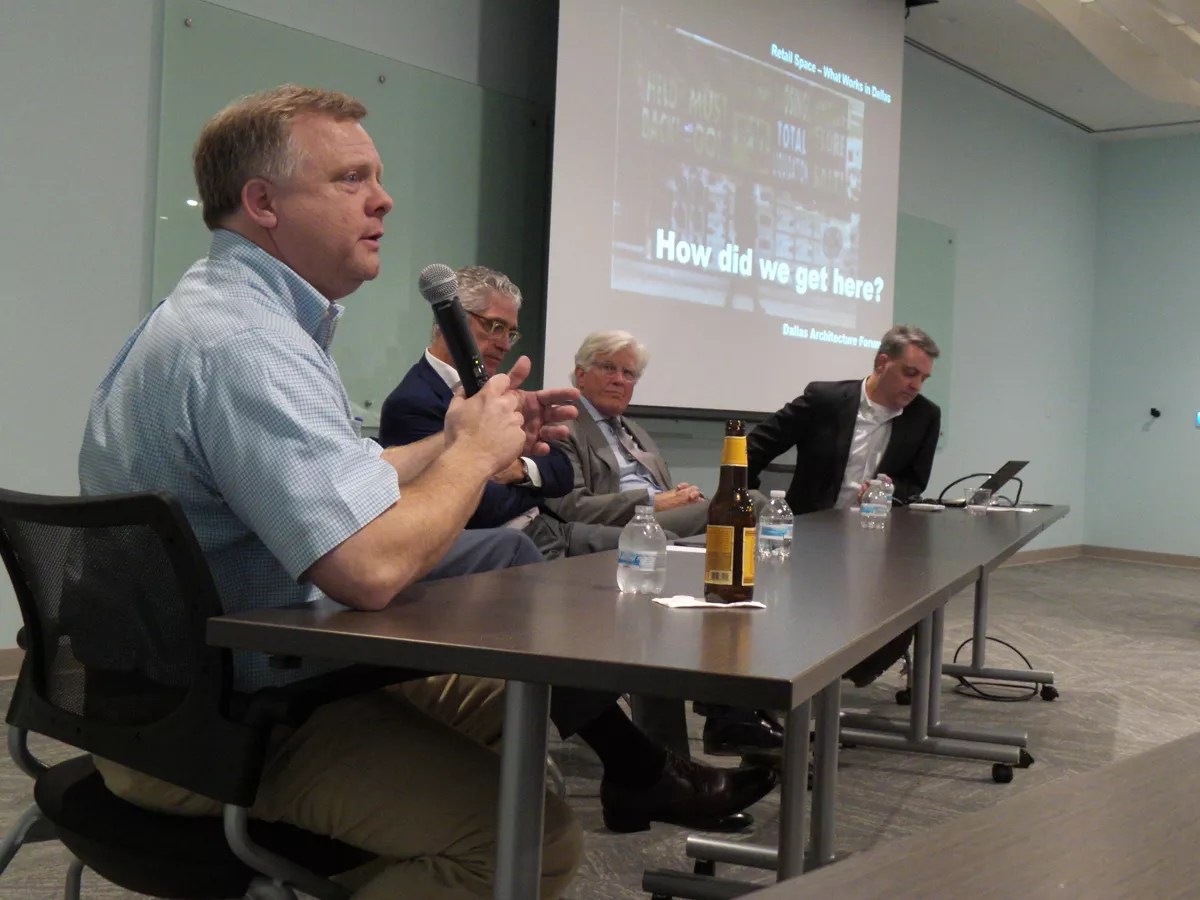
Nicholas Bostick

Audio By Carbonatix
In 2017, most people in the business of property development don’t see a company like Sears as a retail company. They see the one-time titan of American commerce as a real estate business. That’s where its value comes from now.
As companies face stiff competition from online marketplaces and are weighed down by the closing of massive shopping complexes across the U.S., the concept of what retail means is slowly transforming. And Dallas is changing with it.
“There are so many retailers that have heart and soul, and then they go from the heart and soul operator to essentially being run by the CFO,” said Terry Montesi, founder and CEO of Trademark Property Company. “It’s only about numbers and not about serving customers, and so many retailers report to them.”
Montesi was one of four of Dallas’ biggest names in property development and real estate who gathered June 13 at One Arts Plaza to close out the Dallas Architecture Forum’s 20th Anniversary Season Panel Discussion Series with a discussion titled Retail Space – What Works in Dallas.
The panel went into detail on areas of Dallas’ retail space that have consistently succeeded, like NorthPark Center, which panelist Tipton Housewright, principal at Omniplan, had a hand in shaping.
“Well what they’ve done right, of course, is let it be all about the stores,” said Housewright, who likened the mall’s architecture to a frame for the businesses.
Drastic changes in Dallas were also on the table, like the teardown of Interstate 345, an idea that’s been tossed around in private conversations and the media for years. Tearing down the bridge linking Central Expressway and I-45 would free up 21 acres of usable land in Deep Ellum, panel member Scott Rohrman, founder and CEO of 42 Real Estate, said during the discussion.
The move would also remove a barrier between the urban residential areas of South Dallas and downtown. Although panelist Jack Gosnell, senior vice president of CBRE, said he’s for the demolition of the interstate, he added that the actual business of tearing it down would be akin to “tearing out the main vein of your leg.”
The panel also discussed developments in Dallas that haven’t been as successful as hoped, such as Victory Park. It’s undergoing redevelopment by panelist Montesi’s company, with the goal of “taking it from car-centric four-lane roads where people used to go 60 mph to two-lane roads with bike lanes, slowing it down and making the pedestrian at the center of activity and not the sports arena user for a few minutes before the game and a few minutes after,” Montesi said.
“I get to go online now and buy toothpaste and underwear. I’m not bogged down going to Sears or going to Target to buy the things that are not fun to buy. Now I get to plan my retail shopping as an experience.” – Scott Rohrman
The discussion was a casual chat spurred on by occasional ribbing and in-jokes. But every topic dealt with major changes happening in the city and in the world of retail.
“I think this is the most exciting time in retail in my life in the real estate business because I love when change happens,” Rohrman said. “We’re seeing a lot of change, and I think that creates opportunities.”
This change, however, has left large holes in many cities across the country. According to research done by financial services firm Cowen & Co., the U.S. has the most leasable shopping space in the world – 40 percent more than the No. 2 country, Canada. While malls and stores may be closing, that creates more room for the next big thing, Housewright said.
“Retail has always been about fashion; it’s always been about what the next thing is, and so when you see some of these dramatic sea changes in the industry, that’s just sort of how this works,” Housewright said.
He offered an example of what that next thing might be: Creating retail halls with smaller spaces and shorter leases would provide ever-changing venues for smaller businesses to flourish as more people look toward Amazon for their necessities, and brick and mortar shops for an experience.
“I get to go online now and buy toothpaste and underwear,” Rohrman said. “I’m not bogged down going to Sears or going to Target to buy the things that are not fun to buy. Now I get to plan my retail shopping as an experience, and I get to see what’s going on out there that’s kind of cool and edgy and fun, and really I think you don’t get that from online shopping. You can only really get that from a tactile experience.”
These changes are already occurring in Dallas. Gosnell’s company, CBRE, is working on revitalizing the Dallas Farmers Market into not only 25,000 square feet of functioning retail space but also the centerpiece of a 16-acre plot of land that includes the Harvest Lofts and by next year the Taylor Lofts.
“The farmers market was a project that was dying. It was people sitting in the back of broken-down trucks selling grocery produce,” Gosnell said. “It was just awful. … We’ve now got it going as [what will become] a $120 million project.”
But while many of the topics discussed by the panel are still ideas, concepts and, in some cases, quickly materializing realities, the main takeaway is that Dallas’ developers are looking to the future.
“I think there’s a lot of Dallas architecture that is focused on the site,” Rohrman said. “They’re not focused on the community in which they’re built. They’re maximizing value for that site, not necessarily for that community. What we’re trying to focus on is how can we make the whole community make money.”